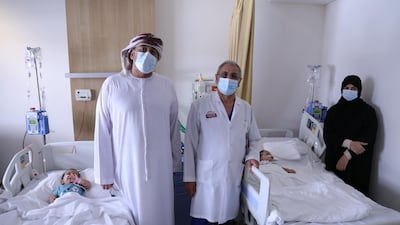Seven-month-old Emirati twins underwent potentially life-saving advanced gene replacement therapy that doctors hope will help cure a rare and deadly disease.
The pair had a severe form of spinal muscular atrophy (SMA1) diagnosed. The rare disease is caused by a defective or missing survival motor neuron (SMN1) gene and affects nerve cells that control the body's skeletal muscles, resulting in the rapid and irreversible loss of motor neurons.
SMA1 affects all muscle functions, including breathing, swallowing and basic movement.
Symptoms of SMA1 begin manifesting in children in the first six months of their lives, said Dr Hussein Matlik, who made the diagnosis.
Dr Matlik, a consultant paediatrician and child neurologist at VPS Healthcare’s Burjeel Hospital, said that if left untreated the disease could be fatal.
It leads to the need for permanent ventilation by the age of 2 in more than 90 per cent of cases, he said.
"The first consultation with the babies showed they were severely weak, had hypotonia [decreased muscle tone], as well as areflexia, which is the absence of neurologic reflexes. This led us to do a genetic test, and as a result the SMA diagnosis test came back positive for both babies," he said.
“We knew that we needed to act fast. Based on the available data, we are confident about the success of the therapy.
"This is a big achievement for the hospital and also another success story for the UAE's healthcare ecosystem."
To treat the disease, the twins received onasemnogene abeparvovec gene replacement-therapy, under the supervision of Dr Amro El Saddik, VPS Healthcare excellence director, and his team.
The therapy focuses on the root cause of the disease with a single dose that introduces a functional SMN1 gene to restore SMN protein expression.
Rashid Al Hasani and Mona Ali, the twins' parents, said they were optimistic that the treatment would be successful.
“We are incredibly grateful to Dr Matlik and the team at Burjeel Hospital for diagnosing our children so swiftly and offering this life-saving gene therapy treatment. We are feeling very positive."

